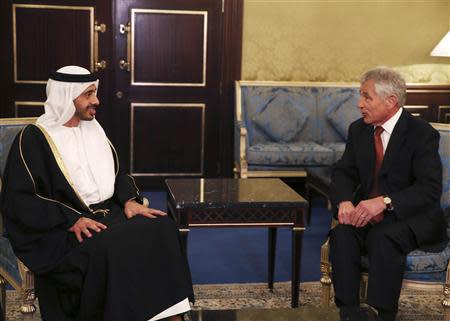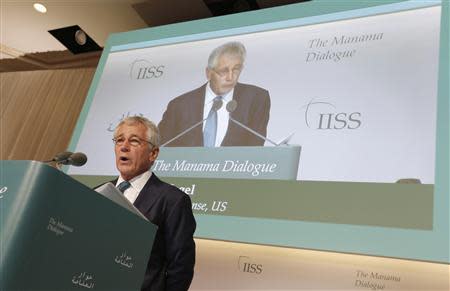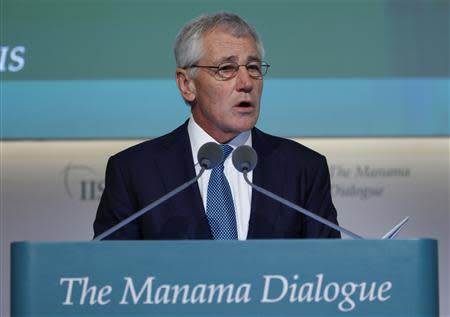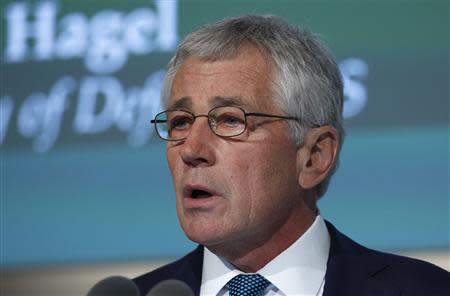Hagel says U.S. commitment to Middle East security endures
By David Alexander MANAMA (Reuters) - Pentagon chief Chuck Hagel told Gulf Arab leaders on Saturday that the United States has a proven and enduring commitment to Middle East security, backed by diplomatic engagement as well as warplanes, ships, tanks, artillery and 35,000 troops. The U.S. defense secretary, speaking at a regional security forum, acknowledged Gulf leaders' concerns about the direction of U.S. policy in the Middle East, especially negotiations on Iran's nuclear program. But he said the U.S. emphasis on diplomacy should not be misinterpreted. "We know diplomacy cannot operate in a vacuum," Hagel said. "Our success will continue to hinge on America's military power, and the credibility of our assurances to our allies and partners in the Middle East." Hagel's remarks to the Manama Dialogue in Bahrain came at a time of heightened tension with Washington's longtime Gulf Arab partners. Leaders in the region fear that the United States will lose focus on the Middle East as it strategically rebalances to Asia. They also are frustrated by the U.S. response to the Arab Spring protests and the Syrian civil war. In particular, the United States distanced itself from Saudi Arabia's decision to send forces to help Bahrain's Sunni Muslim ruler put down protests by the island's majority Shi'ites in 2011. Washington has also irritated Gulf powers with its cautious approach in backing rebels fighting to oust Syrian President Bashar al Assad, informed by concern over divisions among the disparate groups and a reluctance to bring Islamist militants to power. EFFORTS AND FEARS In Manama, Hagel said that, while the United States would continue to provide aid to Syrian refugees and the neighboring countries of Jordan and Turkey, the rise of violent extremism in Syria had to be addressed. "We will continue to work with partners throughout the region to help bring about a political settlement to end this conflict," Hagel said, calling for efforts to ensure that aid for the opposition "does not fall into the wrong hands". Hagel said an interim agreement that six world powers reached with Iran over its disputed nuclear enrichment program had "not diminished our focus on the challenges posed by Iran", which has long vied with the Gulf Arabs for regional dominance. "Iran has been a profoundly destabilizing influence, and a nuclear-armed Iran would pose an unacceptable threat to regional and global stability," the U.S. defense chief said. He said the accord "bought time for meaningful negotiation, not for deception", and that U.S. diplomacy would ultimately be backed up by the military commitments and cooperation it has with its regional partners. A former Iranian nuclear negotiator, Hossein Mousavian, now a visiting scholar at Princeton University in the United States, asked Hagel from the floor why he had not mentioned Israel in his speech when, he said, it possessed 400 nuclear weapons. Israel is widely believed to have the Middle East's only atomic arsenal, though it will not comment on the issue. Hagel did not mention Israel in his reply, noting that Iran was in violation of many U.N. resolutions and the world was "very clear-eyed" about the implementation of the interim deal. UNDERSCORING COMMITMENT Hagel outlined the array of American military forces in the region, including more than 35,000 military personnel "in and immediately around the Gulf." Included in that figure were 10,000 Army soldiers with tanks, artillery and helicopters. He said the United States had deployed its most advanced fighter jets in the region, including the radar-evading F-22. More than 40 U.S. Navy vessels patrol the waters nearby, including an aircraft carrier and its supporting warships, Hagel said. U.S. Navy ships have steamed through the narrow Strait of Hormuz at the mouth of the gulf some 50 times in the past six months in the name of ensuring freedom of navigation. "As America emerges from a long period of war, it will not shirk its responsibilities," Hagel said, citing decades of U.S. involvement in the Middle East. "America's commitment to this region is proven. And it is enduring." Hagel also cited the U.S. military facilities in the region, including the headquarters of its Fifth Fleet in Bahrain, where the Pentagon has a $580 million expansion program under way, and a combined air operations center in Qatar. He proposed new steps to improve security cooperation, including regular discussions of missile defense with the region's air chiefs and allowing the six-nation Gulf Cooperation Council to purchase U.S. defense systems as an organization, to encourage regional cooperation. (Additional reporting by William Maclean; Reporting by David Alexander; Editing by Michael Perry and Ken Wills)




